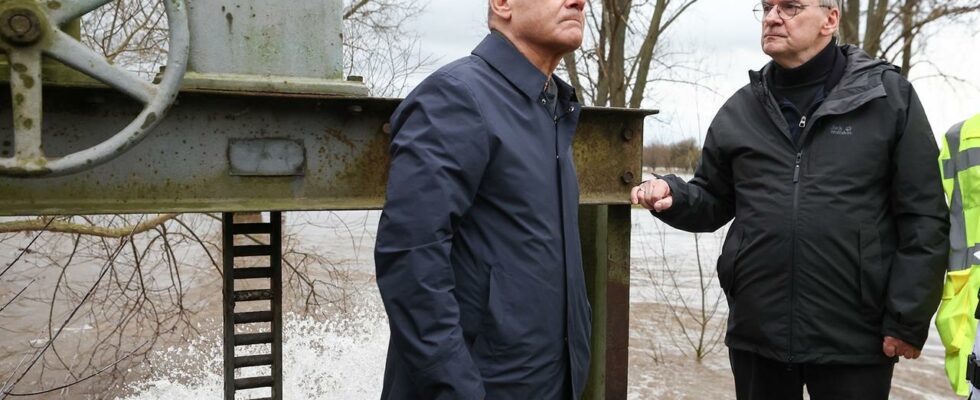Chancellor Scholz is meeting the heads of government of the eastern German states today. The shock of the European elections is still deep. Some state premiers are therefore demanding that the Chancellor correct course.
Rarely has a host seemed to be in a worse mood. Before a meeting of the eastern minister presidents with the Chancellor, Saxony-Anhalt’s Minister President Reiner Haseloff is concerned about the political mood in the country. “We are deeply shocked and shaken,” the CDU politician told journalists last week.
In the European elections, the AfD had previously become the strongest force in all of the eastern German states. Wagenknecht’s party BSW came in third place. A similar picture emerged in the local elections held in parallel in several states.
Politics cannot simply move on to business as usual, said Haseloff. The developments must be “taken very seriously”. Haseloff has therefore announced a discussion with Olaf Scholz at the East Minister Presidents’ Conference taking place today in his hometown of Wittenberg.
Three state elections ago
Haseloff is pushing for course corrections in energy and migration policy. He is not alone among the eastern state leaders in this. Saxony’s Prime Minister Michael Kretschmer has the same priorities. In an interview with the Sächsische Zeitung, the CDU politician called the election results “cries for help from the population.”
Kretschmer accused the Chancellor of having “ducked away” after the European elections. In order to reduce support for the AfD, a “yes, we understand” from Berlin is now needed, said Kretschmer.
For Kretschmer, the pressure is greater: In Saxony, as well as in Brandenburg and Thuringia, state elections are scheduled for September. The majorities for the governing coalitions are shaky.
The heads of government of Thuringia, Mecklenburg-Western Pomerania and Brandenburg also expressed their concern. Bodo Ramelow warned from Erfurt against widening the gap between East and West. “The emotional unity is increasingly breaking down,” the Left Party politician told the newspapers of the German editorial network.
Manuela Schwesig told the NDR-Nordmagazinshe has long felt a “bad mood towards the traffic light parties” in Mecklenburg-Western Pomerania. The SPD politician, however, avoided making any clear statements to the federal government.
After the elections, Brandenburg’s Prime Minister Dietmar Woidke saw a communication deficit in politics in general. Citizens were looking for “answers that we obviously didn’t give well enough,” said the SPD politician on Deutschlandfunk. He also referred to migration. There is also “a lot of room for improvement” in economic policy, said Woidke.
Crucial point Hospital reform
The next controversial topic is already on the agenda for Wittenberg: the hospital reform of Health Minister Karl Lauterbach. According to Reiner Haseloff, the law passed by the cabinet “cannot remain as it is”. The current version would endanger locations, especially in rural areas. For states like Saxony-Anhalt, the question is existential. Further location closures would exacerbate the political situation in the east, warned Haseloff.
Manuela Schwesig, currently President of the Federal Council, sees things less drastically. Her promise from the summer that all hospital locations in Mecklenburg-Western Pomerania would survive the reform still applies, according to the Schwerin State Chancellery. However, there is still room for improvement in the future distribution of tasks.
The states also want to achieve relief in order to be able to keep more trained doctors locally. A reform of the nursing care insurance, improvements to pensions for victims of the SED dictatorship and a renewed debate on network charges are also on the agenda.
Big MPK two days later
Olaf Scholz will be accompanied at the meeting by the Federal Government’s Commissioner for Eastern Europe, Carsten Schneider (SPD), and State Secretary for Economic Affairs Michael Kellner (Greens). Schneider said tagesschau.dewhat is needed is “smart politics that promotes long-term growth for East Germany”. The federal government and the states are working together on this.
He referred to the support for the coal regions. Only on Thursday, the federal government and the coal-producing states decided to be able to use the billions in aid for structural change more flexibly in the future. Brandenburg, Saxony and Saxony-Anhalt will benefit from this.
According to Schneider, “adequate health care in rural areas” and a “climate of openness on site” are also crucial for positive development. The regions are dependent on the influx of skilled workers.
A little over an hour is planned for the consultation between the Chancellor and the state leaders. Scholz will meet with the state premiers again on Thursday. Then there will be a major conference of state premiers in Berlin. The proximity in time is due to the Chancellor’s busy schedule, it is said.
With material from dpa

